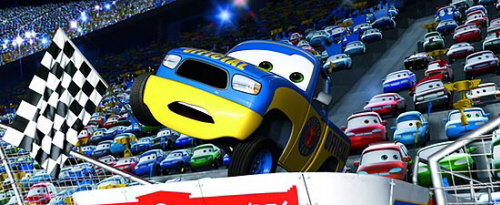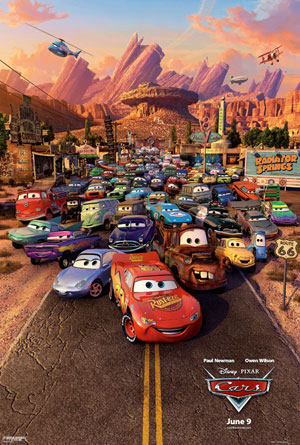 After I ran my piece about Larry the Cable Guy and the Cars junket, someone on the message board asked why I bothered going to this junket anyway, if I was so sour on Larry. The answer’s easy – Paul Newman would be there. The opportunity to sit in a room with Paul Newman and ask him two questions at a press conference was just too good to ever consider passing up.
After I ran my piece about Larry the Cable Guy and the Cars junket, someone on the message board asked why I bothered going to this junket anyway, if I was so sour on Larry. The answer’s easy – Paul Newman would be there. The opportunity to sit in a room with Paul Newman and ask him two questions at a press conference was just too good to ever consider passing up.
Newman’s more than a legend; hell, he’s a food product (this is one Italian boy who only buys Newman’s Own sauce). The man’s delivered some of the finest performances in film history, and he’s managed to do it while living a life filled with grace, dignity and an inspiring love for his wife. There’s no arguing it – Newman’s one of the Good Guys.
The press conference took place at the Media Center at the Lowes Motor Speedway, and that Media Center was located right in the middle of the track. In Cars I saw that the cartoon raceway had an island where RVs parked – I assumed that was some kind of artistic license. Not the case. The track is so big that the island in the middle is large enough to contain a very big Media Center, dozens of RVs, some grass, and a Dominos Pizza.
Newman took questions in front of a life sized mock-up of his Cars character, a 51 Hudson Hornet. When he came in, the inveterate racer wanted to take a look at the machine. When he turned around, he realized not all was right: “Well, I started off badly by coming in here with my fly open.”
Q: How was it working with Owen Wilson?
Newman: We worked together, actually I think I did four or five sessions with the microphone and Owen was in one of those, so we worked together for a half a day.
Q: What did you think of him?
Newman: Very spontaneous, loose, inventive.
Q: Was this love at first sight, a marriage between acting and racing?
Newman: Well, I did it mostly because I knew it would be good. Because Lasseter was working on it, and Pixar. That would be the first consideration reason. That it was about racing was just a bonus.
Q: Had you not made Winning, would you have this passion for cars?
Newman: I don’t think so, no. It was just good fortune that we started that project when we did. And I took to it very slowly. I just kind of worked my way up. But it happened at exactly the right time.
Q: Any advice on how to get to 81?
Newman: Just have as much luck as I’ve had.
Q: How does it fell like to be in the presence of Larry the Cable Guy?
Newman: I’m watching him very carefully, see if I can learn anything.
Q: Are your familiar with his work?
Newman: No.
Q: As a method actor, how did you prepare to play a car?
Newman: Well, the nice thing about animation, you only really act with half yourself. All of the physical stuff that you work on as an actor, you just throw away. So this was, I would say, relatively easy.
Q: Why has Nascar become so popular in the last 10years or so?
Newman: Well, it became popular because it’s a hell of a sport. And I think people can identify very quickly with the cars. It certainly was in the ascendancy in the ‘80s and ‘90s. This schism between a champ car, and the IRL made it a lot easier but they’ve got a very good product and I think we do it well.
Q: Have you found in your career any correlation between enjoying working on a film and the film actually turning out well? Did you work on any films that you loved making and that were bad movies, and vice versa?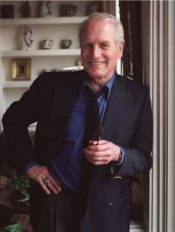 Newman: Well, there are so many ingredients that go into the making of a film. That’s one of the reasons why I like racing. It’s a very simple sense of winning. It’s down to a thousandth of a second now, and electronically and that’s a very uncomplicated conclusion. There’s so many things that go into making a film. The director, the actors that you’re working with, the time that you have to rehearse, whether you catch up with a character in time. There are so many different ingredients that go into making a performance. It’s pretty hard to tell which performer performed the best. Somebody may have started out with a piece of junk and brought it up past mediocrity until it was pretty damn good. And another guy starts off with a beautiful script and deliciously defined character and marvelous director, comfortable schedule and he’s got everything going for him. I would give the credit to the guy in front of him.
Newman: Well, there are so many ingredients that go into the making of a film. That’s one of the reasons why I like racing. It’s a very simple sense of winning. It’s down to a thousandth of a second now, and electronically and that’s a very uncomplicated conclusion. There’s so many things that go into making a film. The director, the actors that you’re working with, the time that you have to rehearse, whether you catch up with a character in time. There are so many different ingredients that go into making a performance. It’s pretty hard to tell which performer performed the best. Somebody may have started out with a piece of junk and brought it up past mediocrity until it was pretty damn good. And another guy starts off with a beautiful script and deliciously defined character and marvelous director, comfortable schedule and he’s got everything going for him. I would give the credit to the guy in front of him.
Q: You were quoted saying that you will do one more film and then quit acting. Is this your last film?
Newman: Well, I don’t seem to be living up to my timetable. [Laughs] I may have one more movie in me. I’m not sure what it’s going to be now. Redford and I are working on something but it’s not by any means a slam dunk. We’re working on the script right now very hard.
Q: In the movie you have a young hot-shot car who becomes lost in the celebrity, the glamour and the glitz. Do you find that in today’s young Hollywood actors and how those that compare with actors during your younger days?
Newman: You got three-quarters of an hour? [Laughs] It’s a really complicated question, a whole different way movies are made, different kinds of pressures, different audience – a completely different audience. I don’t know, there are just too many components to answer that question fairly.
Q: In your long career you’ve played you played great characters, which is most like Paul Newman?
Newman: Well, the 51 Hornet’s pretty close. Joanne says Mr. Bridge. I deny that. There’s always little parts of you that you drop on the floor but I wouldn’t say that any one character came close.
Q: Had you seen Pixar movies? Is the racing in this movie anything close to being on the track?
Newman: Nothing is – watching something is nothing like doing it. Yes, I’ve seen the Pixar films and this one especially I think has got an extraordinary- – I think the challenge of the crowd scenes was particularly well realized. But if you look at the depth of focus of some of these animated shots, it’s quite extraordinary. How would you like to sit down and be responsible for the grandstands with 2000 cars sitting in it? And make each one of them somehow different. They’ve done an extraordinary job, technically.
Q: Could you elaborate a bit on what you’re working on with Robert Redford?
Newman: No. (Laughs)
Q: Comedy, drama?
Newman: Little of each.
Q: What was it about live TV that helped you make the transition from stage to screen star?
Newman: Live television in those days was really exciting because you didn’t have a hell of a lot of time to work on things and if there was a mistake made, it was not retrievable by having another take. So I think working under that kind of pressure was a good experience for any actor. And so funny things happened, too. Sets fell down. I remember Walter Cronkite in a thing called ‘You Are There’ and Joan of Arc was being burned at the stake. The fire began to crackle and then they cut away to Walter Cronkite in the 20th century sitting and saying, “And you are there.” And little by little the smoke from the set came filter into the broadcast room and there was Walter.
Q: I understand that you had the honor of being on President Nixon’s enemy list?
Newman: Highest single honor I’ve ever received. [Laughs]
Q: Are you currently on any enemy lists today and would you like to be?
Newman: Well, I suspect like all of us we’re under surveillance aren’t we? Who knows that may lead to?
Q: Did you have any special connection or memory to Route 66? Since its such a huge theme in the film?
Newman: Joanne and I drove across country and I think we were on there for a little while and I think we were caught being a Yankee.
Q: Any other road trip memories?
Newman: God, that was 140 years ago. No… yes, yes. Actually, we started up North and we drove to Las Vegas. And it said “All you can eat for a buck and a quarter” I think. And we went into these casinos and the spreads were extraordinary. I mean, fresh shrimp, I’m talking 1951, fresh shrimp and lobster, tables laid out like you’ve never seen before. And we had a lovely meal and Joanne put $160 bucks in a slot machine and I lost about $400 playing blackjack so the meal was not really $1.25. (Laughs)
Q: What is your take on the current political climate?
Newman: That’s another one of those have you got 45 minutes? Well, I think that’s pretty much recorded in the polls. I think people don’t think we’re going in the right direction and I agree with them. On many, many different levels.
Q: What would you say to someone who’s disillusioned with politics?
Newman: I was campaigning at the University of Cincinatti and they admitted with a certain amount of shame that the students there, only 19% of the eligible students had voted in the 2004 election. But they had taken polls, the polls had looked good but the kids were on cell phones and they weren’t being polled and the figures were going to be staggering because the kids were engaged. Figures came out, 19%. So if people who have the privilege of voting don’t vote, then you have to ask if they’re really getting what they deserve. We have less of a percentage of eligible voters voting than voted in Iraq. I think that’s shameful. So if people get engaged, they can make the changes. They don’t get engaged, then we just have a chauffer up there motoring us wherever he wants to go instead of us giving the directions.
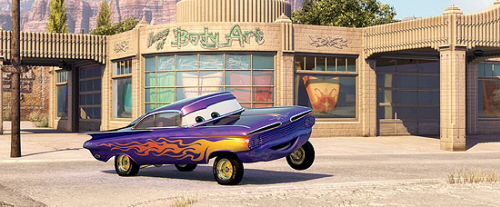
Q: What do you most appreciate about John Lasseter and Pixar, the reason for their success?
Newman: They have an extraordinary sense of detail, both in the creative and the technical. And they don’t get rushed. Which I think is critical. They have the luxury of control and they have the luxury of time. And that gives us a terrific effect. Let alone the gifts that they have.
Q: When you’re presented with a script what does it take to get you out of the house to go to work?
Newman: Well, I don’t think I can play a marathoner right now. I think it would have to be either a wonderful character in a wonderful film or a character that was acceptable in a film with some social content.
Q: What would you tell film executives today about making better movies?
Newman: I haven’t the slightest idea. You have to have enough of an audience who are curious about social issues, personality issues, political issues and if you don’t have a wide enough audience for it, then you’re not likely to be able to get the financing for it. I think Hollywood is in love with sequels. If it’s successful once, just jazz it up and shoot it out there again. I think it’s unfortunate.
Q: What is the greatest psychological obstacle to winning a race?
Newman: I think there are a lot. It really depends on the specific driver. The first thing, you’ve got to have the right kind of equipment. There are a lot of drivers who can carry a car. It doesn’t happen very often very successfully. I think it takes a certain amount of sensible bravery. It’s no good to be brave and just keep crashing. And luck. A lot with track position, equipment and just a lot of elements that go into it. Psychologically, I think the biggest problem is if something happens that puts the car and the driver in a- – something happens to the driver or to the car that is unfortunate, that may or may not be his fault. And he gets so pissed that he can’t drive. And I’ve really seen that happen. A guy gets passed and all of a sudden he’s two seconds off the pace. And somehow it’s always the other guy’s fault. But the state of racing and the quality of drivers now, I don’t think drivers run into much psychological conflict to keep them from winning. I think they’re all good and sometimes just make bad choices.
Q: How do you feel about remakes, particularly the talk about a Damon-Affleck Butch Cassidy and the Sundance Kid?
Newman: I hadn’t heard that. They’re welcome to it. The only character I felt that was worth investigating was Fast Eddie Felson and that would be worthwhile because in The Hustler he won the match, but he lost his livelihood and I thought it would be interesting to find out ‘What would ‘Fast Eddie Felson be doing 25 years later?’ And he was doing exactly what I figured he was doing – selling used cars. But very well.
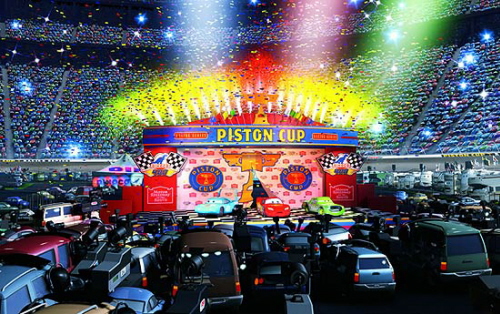
Q: Some actors find it difficult working on an animated film because they work alone in the booth. Was that hard for you?
Newman: I found it very vivid and invigorating because you can have a line and you can say that it’s wrong and you can just jump on it and do it 60 different ways very back-to-back and you certain can’t do it with film. You have to wait till the take is over you gotta to get the lights going and 15 minutes passes before you get another crack at it. This way is wonderful, because you can just keep improvising and improving on it or making it completely different or changing words or… You just have a lot more freedom.
Q: Have you ever been involved with the Sundance Institute and its workshops?
Newman: Yes, I went out there a couple times, very early on and found that I had no gift for it.
Q: What was it or who was it that inspired you to reach for the stars when you were only 8 or 9?
Newman: There was a children’s theater at the Cleveland Playhouse called the Curtain Pullers and I was involved in that, but I had no expectations of being an actor when I was young. I had no expectations of being an actor even after the war. I was an economics major and I got kicked off the football team – under murky circumstances – (Laughs) and I was not much of a student and I had this laundry business that made me very wealthy and I just started going back and doing plays and that occupied my time in my junior and senior year.
Q: What was the flashpoint?
Newman: After I graduated, I went to Yale and it was my intention to get a Masters degree and teach. After my first year, I went back to New York just to see if I could find a summer job and I landed a play that ran for 14 months and won the Pulitzer Prize.
Q: Were you amused by the similarities between Doc Hudson and Fast Eddie Felson?
Newman: Different ballgame.
Q: Many young people might get their first taste of Paul Newman through an animated blue care but if they came to you and asked what movie they should see, what would you tell them?
Newman: It would depend on the kid.
Q: And if you were that kid?
Newman: Movie of mine? The Silver Chalice. Then they would know what bad really was. [laughs]
Q: How important have the Hole-in-the-Wall camps been to you?
Newman: Well, I’ve always said that luck is the key factor in any of our lives. It goes in our makeup, in where you were fortunate enough or unfortunate enough to be born. And I was just acknowledging how lucky I was and how unlucky children are, especially if they get, um. It’s doubly brutal on a child, because A, he doesn’t understand, and B, he gets exempted and left out by his schoolmates for the most part. And if there were just some place for them to lay back and raise a little hell and not be so different, it might give them some respite. We had no idea what a life-changing experience that would be for these kids, eight or 10 days, the parents would come and say, ‘This is not the same child that I sent there.’ It’s astonishing. And they’re sprouting like mushrooms now. I just came back from Hungary. There’s a youth camp that was built by the Communists, so it doesn’t have a lot of color or personality to it, but speaking to the woman who takes care of it, the kids are exactly the same. We went to Milan, there’s a camp starting in Italy and that will be ready in about a year, I think. We took care of 11,000 children last year.
